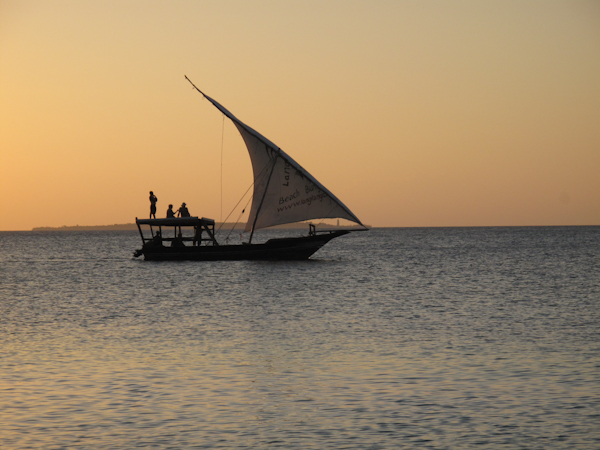 The sun is directly overhead as we ferry along the equator from Dar El Salaam to Zanzibar. Ancient wooden dhous sail on our wake, reeling in full nets for the fish market. The slow ferry saves us money, so we climb aboard claiming two seats, in the shade no less, and wedge between local Tanzanians. The boat fills up beyond capacity as families compete for floor space, men settle on steps and boys perch on railings. As the only wazungu on the back deck, curious eyes fall upon us. Tanzania’s land mass shrinks as we turn into the Indian Ocean for a 4 hour journey, listing wayward, all remnants of shade are displaced, rendering a slow torture of pure sunlight upon our backs.
The sun is directly overhead as we ferry along the equator from Dar El Salaam to Zanzibar. Ancient wooden dhous sail on our wake, reeling in full nets for the fish market. The slow ferry saves us money, so we climb aboard claiming two seats, in the shade no less, and wedge between local Tanzanians. The boat fills up beyond capacity as families compete for floor space, men settle on steps and boys perch on railings. As the only wazungu on the back deck, curious eyes fall upon us. Tanzania’s land mass shrinks as we turn into the Indian Ocean for a 4 hour journey, listing wayward, all remnants of shade are displaced, rendering a slow torture of pure sunlight upon our backs.
Line ups do not exists in Africa, line up to use the toilet, line up to buy a ticket, line up to exit the ferry, I’m sure the verb ‘line up’ has no place in the Swahili dictionary. All at once everyone rushes to get off the boat, pushing and shoving, luggage and elbows flying, I fight to stay behind Jay and let all the years of polite schooling go to hell. Amidst the stench and sweat of the battle, the boat slowly empties, but just enough to let new passengers lay stake for their return journey.
Zanzibar, once the world’s most exotic spice trade island with its turbulent history of brutal takeovers, trade in slave, gold and ivory, remnants of large clove plantations, groves of pineapple, papaya and mango, thatched abodes- truly an ancient world.
Our mornings were spent with Mwana, a Muslim grandmother with a forgiving smile, as we learned Swahili through song and laughter. Tragedy struck on the 4th day when she lost her grandchild of only 40 days to heart failure. On an Island without access to proper health care, there are no x-rays or ultrasounds; the doctors suspected pneumonia at birth and shot her full of penicillin, no further tests done. A country full of mourning families as the staggering infant mortality rates stagnate.
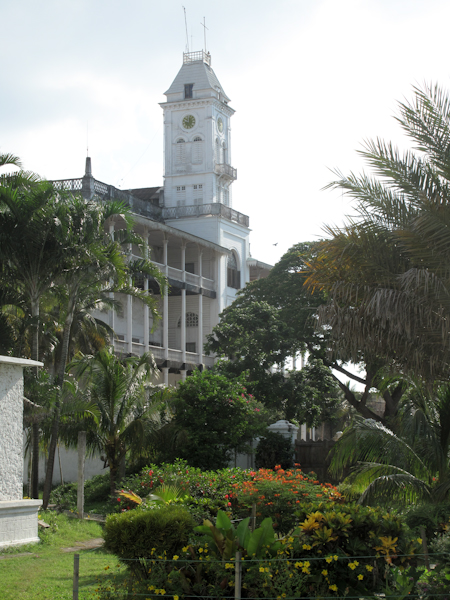 Afternoons we wondered Stone Town, soaking up hours of history. We searched for the beautiful baobab tree and found the remains of the horrifying slave market across the way. Illegal since 1897, the relics include a dank underground cellar and neck chains, pictures illuminate the past with women and children tied to stakes, unable to move. The catholic church has built a cathedral above the old market, using the whipping post as a pulpit for weekly sermons. The student guide asked which religion we held, his response interesting, “Religion is a safe place, it pays for my school, you ask questions and therefore don’t believe, we are taught not to answer questions, we must have faith.”
Afternoons we wondered Stone Town, soaking up hours of history. We searched for the beautiful baobab tree and found the remains of the horrifying slave market across the way. Illegal since 1897, the relics include a dank underground cellar and neck chains, pictures illuminate the past with women and children tied to stakes, unable to move. The catholic church has built a cathedral above the old market, using the whipping post as a pulpit for weekly sermons. The student guide asked which religion we held, his response interesting, “Religion is a safe place, it pays for my school, you ask questions and therefore don’t believe, we are taught not to answer questions, we must have faith.”
The meat and fish markets trump Morocco, as men not only shuck the meat from the animal, but rest lazily on the cutting block next to their sale, often lying in the juices, bare feet exposed. The knives are rusted and dull, often accompanied with a blow of a hammer to slice the pieces free. Odious, I kid you not.
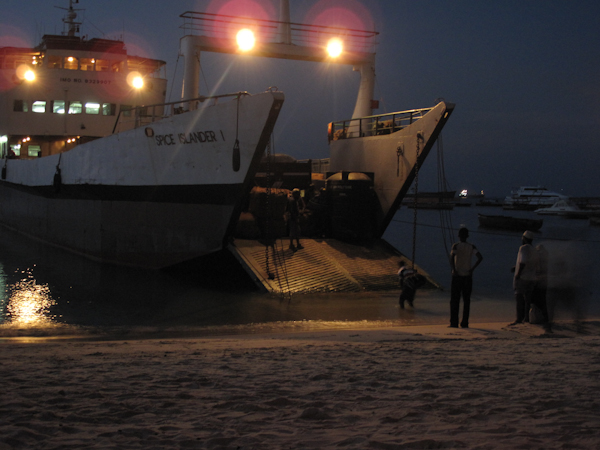
Dr. David Livingstone’s last stop after his heart was buried in Tanzania is now a bar serving happy hour with free popcorn. Our favorite sunsets were at his place, best viewed with a cold Kilimanjaro and toes in the sand.
Every night local kids put on a gymnastics show, as a beached ferry, sans dock, filled with families. Vans weighted with cargo tried to whip across the sand into its strong hold. Night falls and the kids head home, the rising tide eventually lifted the night vessel out to sea, destination unknown. Immigration turns a blind eye.
Another day on Zanzibar.
[smooth=id:16]
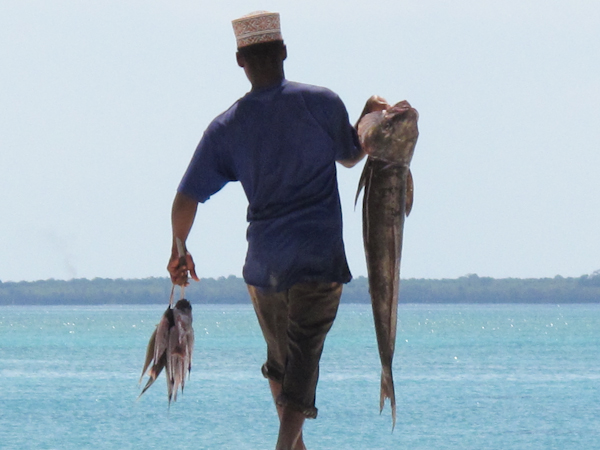 Heeding the advice of fellow travelers, we take a bus to the North of Zanzibar, seeking tranquil beaches and unrelenting sunshine. Kendwa Rocks becomes our new home.
Heeding the advice of fellow travelers, we take a bus to the North of Zanzibar, seeking tranquil beaches and unrelenting sunshine. Kendwa Rocks becomes our new home.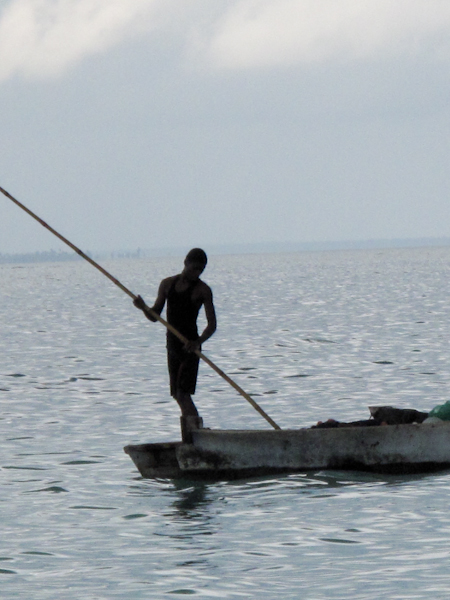
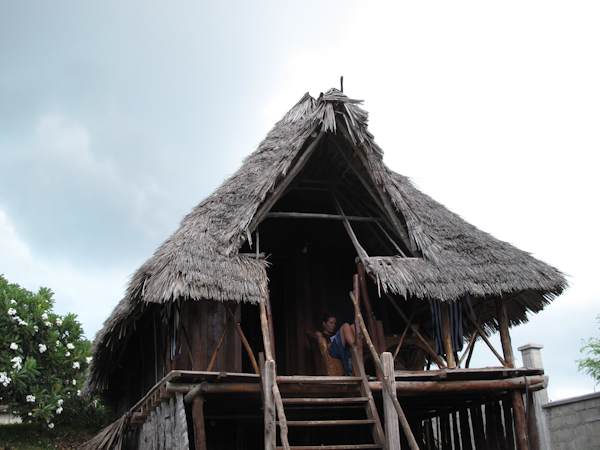

 The sun is directly overhead as we ferry along the equator from Dar El Salaam to Zanzibar. Ancient wooden dhous sail on our wake, reeling in full nets for the fish market. The slow ferry saves us money, so we climb aboard claiming two seats, in the shade no less, and wedge between local Tanzanians. The boat fills up beyond capacity as families compete for floor space, men settle on steps and boys perch on railings. As the only wazungu on the back deck, curious eyes fall upon us. Tanzania’s land mass shrinks as we turn into the Indian Ocean for a 4 hour journey, listing wayward, all remnants of shade are displaced, rendering a slow torture of pure sunlight upon our backs.
The sun is directly overhead as we ferry along the equator from Dar El Salaam to Zanzibar. Ancient wooden dhous sail on our wake, reeling in full nets for the fish market. The slow ferry saves us money, so we climb aboard claiming two seats, in the shade no less, and wedge between local Tanzanians. The boat fills up beyond capacity as families compete for floor space, men settle on steps and boys perch on railings. As the only wazungu on the back deck, curious eyes fall upon us. Tanzania’s land mass shrinks as we turn into the Indian Ocean for a 4 hour journey, listing wayward, all remnants of shade are displaced, rendering a slow torture of pure sunlight upon our backs. Afternoons we wondered Stone Town, soaking up hours of history. We searched for the beautiful baobab tree and found the remains of the horrifying slave market across the way. Illegal since 1897, the relics include a dank underground cellar and neck chains, pictures illuminate the past with women and children tied to stakes, unable to move. The catholic church has built a cathedral above the old market, using the whipping post as a pulpit for weekly sermons. The student guide asked which religion we held, his response interesting, “Religion is a safe place, it pays for my school, you ask questions and therefore don’t believe, we are taught not to answer questions, we must have faith.”
Afternoons we wondered Stone Town, soaking up hours of history. We searched for the beautiful baobab tree and found the remains of the horrifying slave market across the way. Illegal since 1897, the relics include a dank underground cellar and neck chains, pictures illuminate the past with women and children tied to stakes, unable to move. The catholic church has built a cathedral above the old market, using the whipping post as a pulpit for weekly sermons. The student guide asked which religion we held, his response interesting, “Religion is a safe place, it pays for my school, you ask questions and therefore don’t believe, we are taught not to answer questions, we must have faith.”
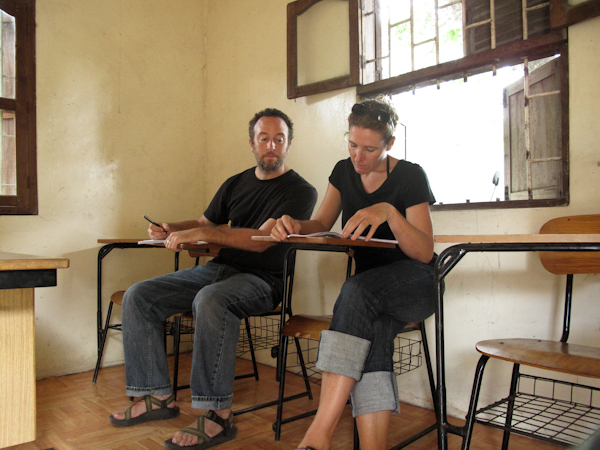 I have always been an impatient, fidgety student with daydreams unconducive to the classroom, yet here I sit, in the classroom. Swahili holds greetings in high esteem and as we sit in the children’s chairs in this one room schoolroom, our teacher, Mwana, fires greeting after greeting at us so we fluidly respond and return the courtesies, again and again, with dynamic aplomb as my elementary notebook floods with ink.
I have always been an impatient, fidgety student with daydreams unconducive to the classroom, yet here I sit, in the classroom. Swahili holds greetings in high esteem and as we sit in the children’s chairs in this one room schoolroom, our teacher, Mwana, fires greeting after greeting at us so we fluidly respond and return the courtesies, again and again, with dynamic aplomb as my elementary notebook floods with ink.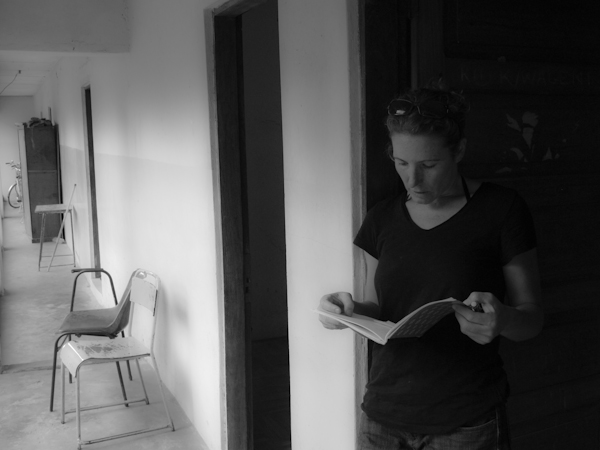 Our class is held at the university by the market and we can practice pleasantries and placing orders at lunch and every question introduces a whole new chapter in grammar. How many noun classes do there need to be? And what the hell is a noun class anyway? As a reprieve, I take out my PADI dive book and work on the first three chapters, preparing for the following days quiz. Non stop learning, shouldn’t I be on vacation?
Our class is held at the university by the market and we can practice pleasantries and placing orders at lunch and every question introduces a whole new chapter in grammar. How many noun classes do there need to be? And what the hell is a noun class anyway? As a reprieve, I take out my PADI dive book and work on the first three chapters, preparing for the following days quiz. Non stop learning, shouldn’t I be on vacation?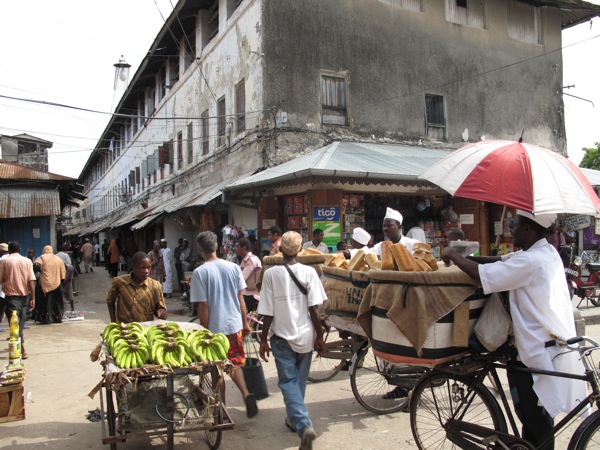 During our free time we navigate the local market. I am fascinated by its color and energy, most specifically the meats and fish. It’s rather disgusting, but I want to get as close as possible without stepping in the blood or accidentally brushing up against the discarded goat heads or entrails. I want to ask a million questions, but for now, our greetings and wide-eyed awe are enough to break the ice and pull us further in. We are forever students, as it should be.
During our free time we navigate the local market. I am fascinated by its color and energy, most specifically the meats and fish. It’s rather disgusting, but I want to get as close as possible without stepping in the blood or accidentally brushing up against the discarded goat heads or entrails. I want to ask a million questions, but for now, our greetings and wide-eyed awe are enough to break the ice and pull us further in. We are forever students, as it should be.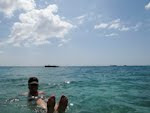 We spent two months in Morocco and never found a single working clock. Everything operated
We spent two months in Morocco and never found a single working clock. Everything operated 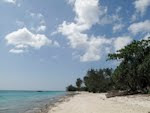 The historic clock towers proudly display times that you might think are wrong, but when you look at ferry schedules and adjust to swahili time, you realize otherwise. While diving, the safety checks include synchronizing our watches, but relying on the instructor, we simply go thru the motions of looking at our wrists, as if time matters, and really, as we later kick back at sunset, our feet in the sand, our beers in our hands, and the sun sinking low, there is no need for any more accuracy than that. We are right on time.
The historic clock towers proudly display times that you might think are wrong, but when you look at ferry schedules and adjust to swahili time, you realize otherwise. While diving, the safety checks include synchronizing our watches, but relying on the instructor, we simply go thru the motions of looking at our wrists, as if time matters, and really, as we later kick back at sunset, our feet in the sand, our beers in our hands, and the sun sinking low, there is no need for any more accuracy than that. We are right on time.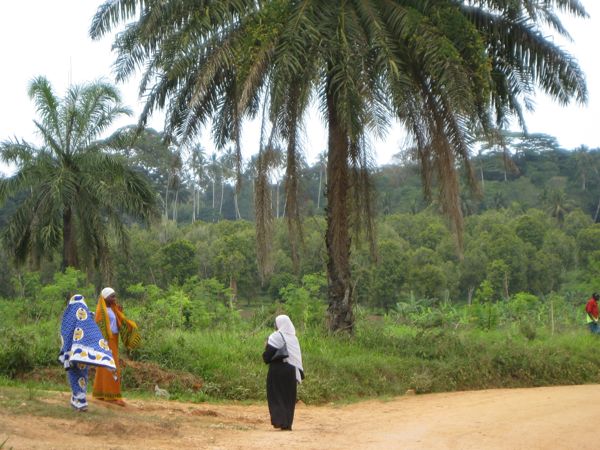 From Paris to Cairo to Dar El Salam, uncertainty ensued at every security check. We were the only passengers without visas or return tickets, and no one knew quite what to do with us. After our Cameroon Visa fiasco, my communication skills were reduced to pleading, begging and almost bribery, Jay’s composure held fest.
From Paris to Cairo to Dar El Salam, uncertainty ensued at every security check. We were the only passengers without visas or return tickets, and no one knew quite what to do with us. After our Cameroon Visa fiasco, my communication skills were reduced to pleading, begging and almost bribery, Jay’s composure held fest.